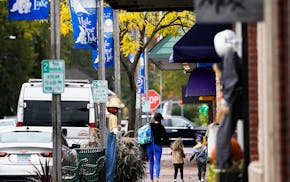The occasional wedding ceremony not only can ease the grind and brighten the day of district court judges, but can add some padding to their pocketbooks.
Hennepin County District Judge Daniel Moreno made nearly $38,000 from wedding fees over the past two years, the most of any county judge. He is frequently sought out because he's Hispanic and speaks Spanish, and officiates about 100 ceremonies a year.
There is no statute or policy on how much judges can charge for weddings, but the typical fee starts at $100. Many of the 45 Hennepin County judges who volunteer to do weddings earn between $2,000 and $6,000 a year. Some won't charge people in the military or first responders or couples who appear to be in tough financial straits.
Beyond earning extra cash, judges say the service they provide is affordable, creates community outreach and may be the only option if a couple can't get married in a religious institution.
"After dealing with constant tragedy from 9 to 5, it's really nice to handle something happy like a wedding," Hennepin County Chief Judge Peter Cahill said. "Not many people want to be in a courthouse."
Couples can call a judge directly or go to the county website or choose from a list of five randomly chosen judges that rotates weekly. Each judge specifies when and where they are willing to perform the ceremony and if they offer any special services. Some judges will do Jewish ceremonies or perform it in Spanish, French or Haitian Creole.
Hennepin County District Judge Kevin Burke, who made $4,600 in fees the past two years, offers to preside over Irish weddings. Judge John McShane is one of five judges willing to do ceremonies in jail or a correctional facility.
The most expensive fee appears to be $350 for a wedding in Hopkins. Judges have held ceremonies at Elm Creek Park Reserve in Maple Grove, the Stone Arch Bridge, exclusive clubs, restaurants and on a boat.
A judge's salary is $134,289 and will rise by $4,000 next month. After Moreno, Hennepin County Judge Kerry Meyer had the highest fee amount over the past two years, earning $18,130. Judge Anne McKeig, who speaks Spanish, made $12,700 in fees.
Moreno, whose parents immigrated from Mexico, said 90 percent of the couples he marries speak Spanish. He receives many referrals and he frequently is requested because of his last name.
Last weekend, he did a wedding at a big hall in south Minneapolis.
"I know it's a very big deal for them to have a Hispanic judge marry them," he said. "They are always very grateful and sweet."
During his eight years on the bench, he's married people from all over the world. One ceremony included a Tibetan priest who blessed everyone and wrapped Moreno and the couple in beautiful silk scarves.
He even performed a marriage ceremony for a juror in the current sexual assault trial he is presiding over.
Cahill, who earned $7,250 in fees over the past two years, recalled a special wedding of a spouse in the military who was about to be deployed. He enjoys the annual event on Valentine's Day when judges will marry couples for free. During the event, one judge sings and another plays piano.
Hennepin County Judge Robert Small ended up performing several same-sex marriages for couples who traveled from out of state following former Minneapolis Mayor R.T. Rybak's public invitation to come. He waived the requirement that couples wait five days after getting a marriage license. Then they asked him to do the ceremony.
One of the couples told the judge they wanted to get married before one of their fathers died. He was so happy he cried when they showed him the certificate. He died the next day.
Like all judges, Small said he learned how to perform a wedding from his colleagues. His clerk helped him with the first wedding, rounding up witnesses for the ceremony.
"I didn't know what, if any fee, was appropriate. So I did it for free," he said.
In his 15 years as a judge, McShane has officiated at more than 25 ceremonies in jails or prison. Every person has the right to be married, and the law doesn't preclude somebody who is in prison, he said.
"I've seen some pretty moving moments at those ceremonies," he said. "The things couples say are very loving, thoughtful and moving," he said.
Marrying an inmate comes with particular challenges, and McShane praised respectfulness shown by sheriff deputies during the ceremony. The inmate stands behind protective glass, and is allowed to hold hands and exchange rings through a 6-inch opening. The ending kiss comes through a small, open circle in the glass used to speak through.
McShane, who made about $8,000 doing 70 weddings last year, once had to tell a couple they were too drunk to get married. Another time the groom passed out cold and the rest of the ceremony was done while he lay on the floor, his family and friend seated next to him.
Moreno said he will sometimes bring his three children to weddings. At holidays, the kids see his wife's German-Scandinavian relatives and traditions. Going to a Hispanic ceremony, they are connected to his culture, he said.
It's humbling to walk into an apartment living room, take off your jacket and put on the robe, he said.
"I look at the people and I see my mom and dad, aunts and uncles," he said.
Moreno worked 60 to 70 hours a week in a packing plant to pay for college. It's just not possible for kids to do the same anymore, he said.
"I tell my kids I get paid for doing ceremonies," he said. "I tell them it's for their college education."
David Chanen • 612-673-4465

Minnesota added thousands of jobs in March but worker shortage still an issue
Private prison van driver, accused of raping St. Paul woman he was transporting, gets 30 years for similar attacks

Shop the curbs for free on 'Trash to Treasure Day' in White Bear Lake
Longtime Uptown boutique closing in May

